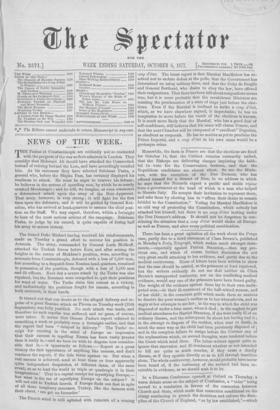In a Diocesan Conference opened. at Oxford on Thursday, a
warm debate arose on the subject of Confession, a "rider" being moved to a resolution in favour of the connexion between Church and State, which made that connexion conditional on the clergy continuing to preach the doctrines and enforce the disci- pline of the Church of England, "as by law established,"—which meant in effect, so long as they kept clear of the Confessional. Mr. Walter, M.P., amongst others, made a warm speech against this and other ultra-High-Church practices, and though on a division the rider was rejected by 127 against 89, no one who knows the slovenly way in which the elections to these Diocesan Conferences axe managed, would infer from that that the laity of the diocese of Oxford, if properly repre- sented, have given a majority against it. The truth, no doubt, is that our present Liturgy does explicitly recognise, and, for sick-beds at least, directly encourage, auricular confession, and does also provide a form of absolution of the strongest kind, and that the only honest way of getting rid of the practice is to re- form the Liturgy. The Rev, M. Noel declared that the late Bishop Wilberforce received confessions, and especially received his own (Mr. Noel's) confession before his ordination,—from which, however, it would hardly follow that if the Bishop had lived to the present day, he would have been found on the Ritualist side in this matter,—and indeed, it is perfectly clear that it is impossible for any Church, which promotes such confessions from the sick and dying, to make an offence of receiving a confession in full health. What is good for the soul of a sick man, whose temptations are chiefly in the past, must be good for the soul of a healthy man who is living in the midst of present temptations.



































